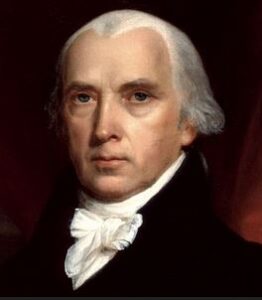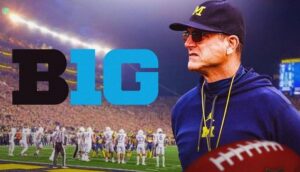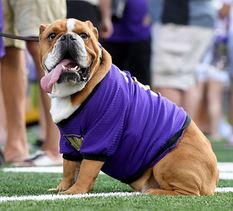Podcast: Play in new window | Download
Subscribe: RSS
While the so-called “big dogs” of the NCAA’s FBS group stay atop the polls with help from the major market media, there is a team of hungry dogs in the Sunbelt Conference just hoping that someone will finally spring them loose from the NCAA’s post-season pound soon.

The James Madison Dukes of the Sunbelt Conference are now 9-0. One of the seven remaining unbeaten teams this week, JMU is ranked #3 in my latest SwampSwamiSports.com Top 25 for this week. The less-than-appreciative AP poll has JMU at #21.
The Dukes played for decades in the smaller-school FCS football grouping. A founding member of the Colonial Athletics Association, James Madison University became an FCS football power in the past two decades. The Dukes reached the FCS national semifinals five times during their final six seasons at that level (which ended after the 2021 season).
James Madison University then decided to move up into the FBS (upper division) beginning with the 2022 football season as it was welcomed into the Sunbelt Conference.
However…
According to the current NCAA rules, any football team which moves up from the FCS group into the FBS is not permitted to participate in post-season games during the team’s first two seasons of competition at the higher level.

That means that this year’s unbeaten 9-0 James Madison University Dukes football team is currently ineligible to play in its own conference championship (a post-season game) and in what would likely be a lucrative bowl game over the holiday season.
This odd NCAA rule has been around for more than twenty years. Times have changed. At the time, it may have made some sense (?), but it certainly doesn’t in 2023.
In just the past few years, the NCAA has loosened its long-time rules relating to student transfers (instituting the NCAA Transfer Portal) and allowing athletes to cash-in on their name, image, and likeness (NIL) in recent years.

The current rule which is keeping the James Madison Dukes in post-season Siberia should be changed immediately.
JMU is a highly competitive football team. Most college football fans (like me) want to see how well the Dukes would line-up against a competitor from another major conference during the upcoming bowl season.
The James Madison Dukes are no fluke. They would make for an entertaining match-up against any nationally known “brand” school.
The Dukes are squarely in a financial (pardon my pun) dogfight to play in a New Year’s Day bowl game in less than two months which could pay the school upwards of $10 million.

That is because the highest ranked so-called “Group of Five” conference team will receive an automatic invitation to play in one of the high-paying New Year’s Day bowl games.
The Group of Five conferences are the American Athletic Conference, Conference USA, Mid-American Conference, Mountain West Conference, and the Sunbelt Conference.
This week, the top rated (according to the Associated Press) Group of Five football team is the 20th ranked (and 9-1) Tulane Green Wave from the AAC. Unbeaten James Madison of the Sunbelt Conference is just one spot back at #21. Conference USA’s Liberty University (also 9-0) is currently third in the Group of Five race at #25.

Last year, Tulane (then 12-1) was selected to play in the January 1, 2023 Cotton Bowl game and knocked-off USC in a 46-45 thriller. The Greenies garnered a lot of positive publicity and cash for their New Year’s Day bowl game appearance.
James Madison would like to have that same opportunity this year – if the NCAA will quickly change an unnecessary rule which would keep JMU at home once again this year.
James Madison University was founded in 1908 as and is located in northwest Virginia in the city of Harrisonburg. It is a growing public research university.

The school is named after one of America’s founding fathers, James Madison. The Virginian was best known as the “Father of the Constitution” and the Bill of Rights. He later served as America’s fourth president for two terms during the period 1809-1817. His family estate named “Montpelier” was located in nearby Orange, Virginia.
James Madison was a rather short gentleman at 5’4”. On the campus at James Madison University, there is a statue of President Madison which happens to be of the same height. It is affectionately known as “Little Jimmy”.

The wife of James Madison was, indeed, Dolley Madison. She was best remembered as an elegant hostess for the parties given on behalf of visiting dignitaries at the White House. Today’s well-known bakery brand took the name of “Dolly Madison”, too. The company is owned by, ironically, Hostess Brands.

What a delicious coincidence!
Today, James Madison University has grown to about 20,000 students. It has a nationally respected business school. The scenic campus in the Shenandoah Valley of northwestern Virginia features a bridge and a tunnel (called Duke Dog Alley) over and under Interstate 81 in order to connect the east and west portions of the school.

In case you were wondering, the school’s nickname of “Dukes” was based on the last name of a former JMU President named Samuel Page Duke. Decades later, a university professor came-up with the idea for the school’s bulldog-themed royal mascot named “Duke”.
James Madison University started playing football in 1972. The Dukes play in a 25,000 seat stadium which features views of the Blue Ridge Mountains in the distance. The most famous football alumnus of JMU is former NFL defensive end Charles Haley. He won five Super Bowl rings with the San Francisco 49ers and Dallas Cowboys in the 1980’s and 1990’s.
In 2023, James Madison University’s football team is currently scheduled to be kept out of the post-season for the second straight year. The school’s administration and supporters are desperately trying to get the NCAA to re-think its current policy relating to JMU prior to the bowl invitations going out by the end of November.
On Monday, James Madison University officials made their latest appeal to the NCAA’s board of directors. They have asked the NCAA to reduce its football program’s FCS to FBS transition period from two years to one year. If approved, the currently-undefeated Dukes would become eligible to compete in postseason competition immediately after the regular season ends in a few weeks.
The letter to the NCAA stated that the Dukes have “embarked on this transition in ways that no other institution has since the transition rules changed 23 years ago” and that the school’s “student-athletes have achieved an astonishing, unprecedented level of success during this period.”
JMU officials added, “Relief that allows our student-athletes to participate in a bowl game, as their play has earned, is warranted. Our student-athletes have done everything the right way, and they view the postseason prohibition in this instance as inexplicable punishment in light of the NCAA’s stated priorities. This is an opportunity for the NCAA to do the right thing for our student-athletes and recognize their exceptional efforts on and off the field.”
Unfortunately, this is not the first time that James Madison University has appealed this two-year transition rule. The NCAA denied the school’s first appeal in April of this year.

According to reports, James Madison is the first school to appeal the NCAA’s two-year ban on post-season football which applies to teams moving up from FCS to the top level FBS.
Then again, most programs moving up have not performed nearly as well as James Madison has this season. Even in the school’s inaugural season at the FBS level in 2022, JMU went 8-3 and, sadly, was left out of a post-season bowl opportunity.
I am trying to understand why the NCAA would prohibit any new entry at the FBS level from participating in post-season games. More importantly, why was this ban for two years?
The only thing I can (slightly) remember is that there were significantly fewer bowl game opportunities for teams to play in 20+ years ago. Since the year 2000, the NCAA has approved 21 (correct) new post-season bowl games.

In 2023, almost every major college team which finishes with a 6-6 record will receive a bowl invitation. With 133 FBS schools, there are 84 available post-season slots to fill. The math says that James Madison University would only (perhaps) bump a team with a mediocre record in 2023.
The NCAA should quickly and easily change this rule. It just doesn’t make sense anymore.
If a team is granted permission to play at the FBS level, that team should be immediately eligible to play in any post-season game – including the College Football Playoffs.
If you want to know why so many fans have become frustrated with the NCAA over the years, think about this possible scenario in the coming weeks.
As James Madison University is being penalized for no apparent reason other than an antiquated rule, the University of Michigan (also 9-0) is being scrutinized for a possible sign stealing scandal which may have involved one or more members of its football department.

Michigan is one of the current favorites to participate in the lucrative four-team College Football Playoffs. There is a very real possibility that this sign-stealing scandal may not be fully resolved before College Football Playoffs award the championship trophy in January.
What if Michigan should win the national championship, but the NCAA later confirms that the school had been cheating?
Meanwhile, the NCAA would have kept sophomore FBS member James Madison University completely out of the post-season utilizing a rule which is unnecessary in 2023. The NCAA would face a major embarrassment by having delayed ruling on possible major violations which may have occurred at Michigan.
The NCAA has the power and should correct one of these two issues immediately.

FREE JAMES MADISON UNIVERSITY!!!

